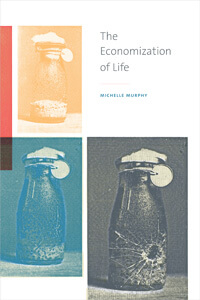
Fleck Prize 2019: Michelle Murphy
The Fleck Prize committee is delighted to award Michelle Murphy the 2019 Ludwik Fleck Prize for her book The Economization of Life (Duke University Press 2017). The Fleck Prize recognizes an outstanding book in the area of Science and Technology Studies (STS). The committee evaluated nominated books on their contributions to the field of Science and Technology Studies, their novelty, and their overall scholarly quality.
The Economization of Life is a riveting read and a perception changing journey that illustrates how the stories we tell about the world create and constrain the worlds we build. The book opens with Raymond Pearl’s fruit fly experiments whose bottled living and collective dying demonstrated that populations crash when they outstripped their resources. The flies’ charismatic deaths captured western policy and scientific imaginations by fueling Malthusian and eugenic fears that, under conditions of earth’s limited resources, humanity is destined to the same catastrophic fate.
Murphy describes how, based on precious little evidence that the world is indeed like Pearl’s bottles, Western nations began to act as if it was, counting their populations and those of non-western nations, attempting to quantify available resources, developing metrics for growth like Gross Domestic Product (GDP), that everyone accepts are inaccurate, partial and limited but employ and deploy anyway. The result, Murphy argues, is the development of a heterogeneous-pervasive-experimental system bent on measuring and controlling human populations through economic incentives that retain the dominance of Western nations, enacting racism without using the term race, and thus justifing all manner of harm in the present to subordinated populations for the sake of imagined futures.
From her initial questioning of Pearl’s highly limited experiments, Murphy asks the reader to wonder with her if there are other ways to understand aggregate life that do not demand a contained existence that ends in extermination? Answering this question is vital not just for the flies, Murphy argues, but because by imagining the world through Pearl’s experiments and implicitly accepting that we might ourselves be fruit flies and the world agar, we have built systems that enact that fate. We have in effect bottled ourselves to living in an imaginary constrained system through the theory and practice of population and economy that turns each of us (to varying degrees) into research and experimental subjects and limits other ways of realizing the world.
Murphy uses the word containers to point to the conjoined nature of the theory and practice of population and economy. They are epistemic infrastructure, knowledge making systems that produce and require particularly physical worlds, because to control a population it must be measured and to manage resources they must be accounted for. Measuring and accounting requires infrastructure, bureaucracy, databases, buildings, funding, education systems, which must, by virtue of their object of study, the national population or GDP, continue ad infinitum to produce information about their subjects. Murphy illustrates how this scientization of life expands to all life-forms in the global efforts to render the world an economy comprised of resources and humans into populations.
The perceived pressing need to manage non-western population growth (while not becoming responsible to them as citizens or perhaps humans), spurs Cold War efforts by the US and others to measure and limit population growth in postcolonial spaces through an array of birth control interventions. Murphy shows how irresponsible, untested and unethical many of these interventions have been as they focus on individuals to limit how many children are born, without expanding infrastructure that might better support aggregate life.
Instead of expanding life-supporting state infrastructures, Murphy shows how the epistemic infrastructure of population and economy expand to count people and resources and create experimental environments where new policy, medical and economic practices can be implemented. Under the advice of Western experts in these experimental sites (like Bangeldash’s Matlab thana region) the problems of poverty and inequity are not solved but continually re-created as experimental zones. In these zones, more research can always be performed and more subjects offered up for investigation. Moreover the solutions produced through these epistemic-infrastructures tend to sustain individualized bare-life such as medication to prevent death by dehydration from diarrhea rather than clean water systems that would enable collective thriving through systemic solutions that prevent illness.
The efforts Murphy describes reach their pinnacle in invest in a girl campaigns that attempt to render postcolonial subjects into neoliberal individual economic actors by selling the idea that investing in a single girl, rather than building a public school system, will enable women to enter the economy and to choose to have fewer children. Like micro-financing, these policies individuate collective problems making each person a little bottled fruit fly managing their own piece of limited resources rather than building systems that sustain aggregate life through building interdependent, multi-species cycles of generation and degeneration.
The book makes major contributions across many fields of STS, combining gender studies, laboratory studies, history of science, economic history, and post-colonial studies, keenly demonstrating that core STS insight that the metaphors we think with matter. Murphy incisively cuts through the phantasms that economy and populations are inevitable by showing how they are cobbled together from poorly evidenced theories, epistemic-infrastructures that demand their own replication while never producing accurate representations, extractive systems of data-gathering, irresponsible experimentalization of life that perpetuates gross inequity, and a very limited imagination of what living within this world possibly could be and perhaps alway has been. Moreover, by implicating both scientific and social scientific expertise in expanding and enacting these harmful epistemic infrastructures, her work pushes us to imagine how social scientific and scientific experts could act more responsibly and generate more just forms of knowledge production and sharing.
Visit the book website.
Fleck Committee 2019: Sara Wylie, Oscar Maldonado, Lesley Green, Hsin Hsin Chen
Acceptance Statement
I was honored to learn that The Economization of Life was awarded the Ludwick Fleck Prize. I was especially humbled because 4S has been an important intellectual home. The book grew from a desire to follow the technologies of reproductive health in their transnational circuits, as well as a need to bring feminist and anti-colonial STS understandings to the emergence of population as a dominant concept of the twentieth century, one that ordered nation-states, built sprawling multi-generational experimental platforms, and, most importantly, undergirded racist and gendered modes of devaluing life. The book became a study of the reproduction of infrastructures built in the name of governing population and the national economy together, and thus about the creation of new modes of valuing and devaluing human life for the sake of national economies. It calls for the end to the use of the concept population and the invention of creative new concepts that might better manifest dreams of feminist and decolonial reproductive justice. Perhaps the most important point about the scholarship of this book is that it was done with inspiration and support from so many friends, students and colleagues at 4S and beyond. The book began in conversations with Kavita Philip, Cori Hayden, and other scholars at 4S working towards critical transnational frames for studying technoscience. It was supported by the writing group Oxidate organized by Lochlann Jain and Jake Kosek; the Engineered Worlds project and Joe Masco; Duke University Press, as well as the wonderful community of scholars, including students, at the Technoscience Research Unit and the Technoscience Salon in Toronto. The book was materially made possible by the support of the Social Science and Humanities Research Council of Canada. Thank you to the 4S Fleck committee for their consideration.
Bio
Michelle Murphy is a Professor of History and Women and Gender Studies at the University of Toronto. She is a historian and feminist STS scholar whose research concerns decolonial technoscience with a focus on environmental, reproductive, and data justice. She is the author of The Economization of Life (2017), Seizing the Means of Reproduction (2012), and Sick Building Syndrome and the Politics of Uncertainty (2006), all with Duke University Press. She is Director of the Technoscience Research Unit, co-organizer of the Toronto Technoscience Salon, a founding member of the Environmental Data and Governance Initiative, and an editor of the journal Catalyst: Feminism, Theory, Technoscience. She is urban Métis from Winnipeg.


